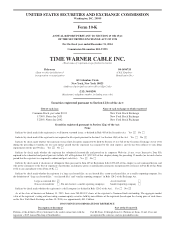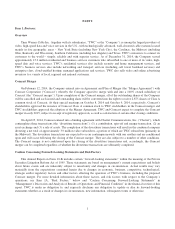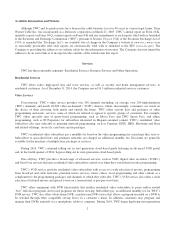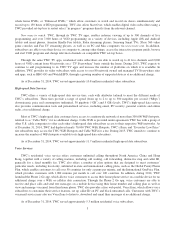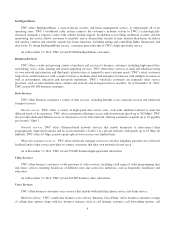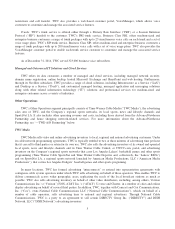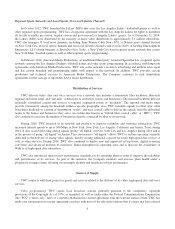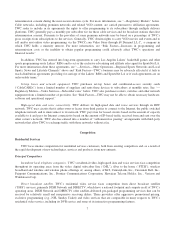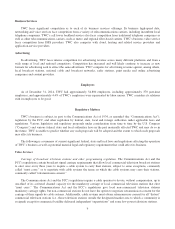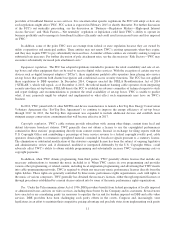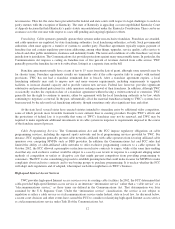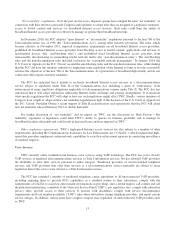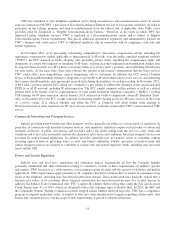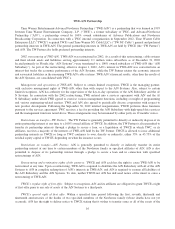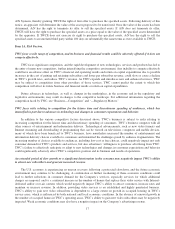Time Warner Cable 2014 Annual Report Download - page 15
Download and view the complete annual report
Please find page 15 of the 2014 Time Warner Cable annual report below. You can navigate through the pages in the report by either clicking on the pages listed below, or by using the keyword search tool below to find specific information within the annual report.retransmission consent during the most-recent election cycle. For more information, see “—Regulatory Matters” below.
Cable networks, including premium networks and related VOD content, are carried pursuant to affiliation agreements.
TWC seeks to include in its agreements the rights to offer programming to its subscribers through multiple delivery
platforms. TWC generally pays a monthly per subscriber fee for these cable services and for broadcast stations that elect
retransmission consent. Payments to the providers of some premium networks may be based on a percentage of TWC’s
gross receipts from subscriptions to the services. Generally, TWC obtains rights to carry VOD movies and events and to
sell and/or rent online video programming via the TWCC.com Video Store through iN Demand L.L.C., a company in
which TWC holds a minority interest. For more information, see “Risk Factors—Increases in programming and
retransmission costs or the inability to obtain popular programming could adversely affect TWC’s operations and
financial results.”
In addition, TWC has entered into long-term agreements to carry Los Angeles Lakers’ basketball games and other
sports programming on its Lakers’ RSNs and to act as the exclusive advertising and affiliate sales agent for SportsNet LA.
For more information about these agreements, see “—Services—Other Operations—Regional Sports Networks and Local
Sports, News and Lifestyle Channels” above and “Risk Factors—TWC’s business may be adversely affected if it fails to
reach distribution agreements providing for carriage of the Lakers’ RSNs and SportsNet LA or if such agreements are on
unfavorable terms.”
Set-top boxes and network equipment. TWC purchases set-top boxes and conditional-access security cards
(“CableCARDs”) from a limited number of suppliers and rents these devices to subscribers at monthly rates. See “—
Regulatory Matters—Video Services—Subscriber rates” below. TWC also purchases routers, switches and other network
equipment from a limited number of providers. See “Risk Factors—TWC may not be able to obtain necessary hardware,
software and operational support.”
High-speed data and voice connectivity. TWC delivers its high-speed data and voice services through its HFC
network. TWC uses circuits that it either owns or leases from third parties to connect to the Internet, the public switched
telephone network and to interconnect to its network. TWC pays fees for leased circuits based on the amount of capacity
available to it and pays for Internet connectivity based on the amount of IP-based traffic received from and sent over the
other carrier’s network. TWC also has entered into a number of “settlement-free peering” arrangements with third-party
networks that allow TWC to exchange traffic with those networks without a fee.
Competition
Residential Services
TWC faces intense competition for residential services customers, both from existing competitors and, as a result of
the rapid development of new technologies, services and products, from new entrants.
Principal Competitors
Incumbent local telephone companies. TWC’s residential video, high-speed data and voice services face competition
throughout its operating areas from the video, digital subscriber line (“DSL”), fiber to the home (“FTTH”), wireless
broadband and wireline and wireless phone offerings of, among others, AT&T, CenturyLink, Inc., Cincinnati Bell, Inc.,
Fairpoint Communications, Inc., Frontier Communications Corporation, Hawaiian Telcom Holdco, Inc., Verizon and
Windstream Corp.
Direct broadcast satellite. TWC’s residential video service faces competition from direct broadcast satellite
(“DBS”) services, primarily DISH Network and DIRECTV, which have a national footprint and compete in all of TWC’s
operating areas. DISH Network and DIRECTV offer satellite-delivered pre-packaged programming services that can be
received by relatively small and inexpensive receiving dishes. These providers offer aggressive promotional pricing,
exclusive programming (e.g., NFL Sunday Ticket) and video services that are comparable in many respects to TWC’s
residential video service, including its DVR service and some of its interactive programming features.
7




